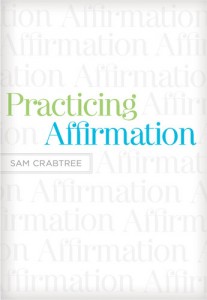“I had not noticed how the humblest, and at the same time most balanced and capacious, minds, praised most, while the cranks, misfits and malcontents praised least” (C S Lewis).
 Well, we’d better learn how to praise others then. And that’s where Sam Crabtree’s book, Practicing Affirmation, is so helpful. I needed this book and have to say that it’s been the most influential book upon me so far this year.
Well, we’d better learn how to praise others then. And that’s where Sam Crabtree’s book, Practicing Affirmation, is so helpful. I needed this book and have to say that it’s been the most influential book upon me so far this year.
But I don’t think it’s just me that needs it. As I highlighted yesterday, praising others does not come easily to Scots in general; and, I’m afraid, certain cultural trends are influencing even positive optimistic Americans in the same direction.
Today I want to summarize ten characteristics of good affirmation that I picked out of Sam’s book, together with some supportive quotes.
1. Good affirmations are God-glorifying
Although the chief end of man is to glorify God, God is glorified in us when we affirm the work he has done and is doing in others. (1)
We rob God of praise by not pointing out his reflection in the people he has knit together in his image. (18)
2. Good affirmations are God-centered
Paul’s practice is, “I thank God for you.” Yes, the person is refreshed by the expression of gratitude, but God gets the glory. We are wise to give God-centered thank-yous and God-centered affirmations. (18)
3. Good affirmations don’t wait for salvation
In the same way that Yellowstone Park is a reflection of common grace, unregenerate persons reflect graces not intrinsic to themselves. To affirm the beauty of their character is to draw attention to the undeserved grace that God has bestowed upon them in the form of faint echoes of Jesus, even in the presence of as-of-yet unperfected flaws in those same individuals. (32)
4. Good affirmations are honest (67)
Commend only the commendable. Phony commendations are simply deceptive and manipulative flattery.
5. Good affirmations don’t wait for perfection
We can truthfully say to an unregenerate four-year-old, “God is helping you become more . . .” and fill in the blank with qualities such as: careful with your things (as a steward), cheerful around the house as a singer…While the child’s growth in character is commended, God is identified as the source. (21)
6. Good affirmations encourage progress
Affirmation is not about lowering standards. It is about commending incremental progress toward those standards as those standards reflect the character of Christ. (71)
Behaviors that are rewarded and celebrated are more likely to be repeated. (74)
7. Good affirmations help evangelism
Consider this: we risk damning others by not praising them. There are people around us in peril of hell unless we commend them…Affirmation is a way to gain a hearing for the Gospel…Our listeners will be more inclined to hear us is they believe we’re not angry at them, but grateful for them. (20-21)
8. Good affirmations open the door to change
Just as bedside manner is not the most important thing a doctor provides for his patients, without it patients may resist more important medicines and procedures. (38)
Here then is the simple principle: people are influenced by those who praise them. Giving praise does wonders for the other person’s sense of hearing. (54)
9. Good affirmations refresh the affirmer
Part of God’s mercy to us when we refresh others is the boomerang effect he has designed into the universe: “He who refreshes others will himself be refreshed.” (42)
10. Good affirmations build relationships
Geese honk encouragement and fly in formation. Skunks travel alone. (80)
I hope these quotes will encourage you to buy the book and join the geese. But what about when we have to be the skunk? What about the place of correction and rebuke? Sam devotes many pages to this in his book, and I hope to summarize his teaching on this tomorrow.
Then I want to round off the series by highlighting something that I think needs some clarification, and that’s a biblical definition of what constitutes a “good work.”
Practicing Affirmation Review (1): Scots don’t do praise
Practicing Affirmation Review (2): 10 ways to praise people
Practicing Affirmation Review (3): Is the “sandwich method” a lot of baloney?
Practicing Affirmation Review (4): Should we praise unbelievers?
Pingback: Gleanings 5 22 2012 | Cornerstone Worship Center